For years the BBC has been using terms such as “siege” and “open-air prison” to describe the counter-terrorism measures imposed by Israel and Egypt on their borders with a territory controlled by a proscribed terrorist organisation, with most of the vehemence directed towards Israel.
Such narratives continue to be promoted, despite occasional reality checks:
STATS DEFY THE BBC’S REPEATED PORTRAYAL OF A ‘SIEGE’ ON GAZA
HAMAS ANNOUNCEMENT PUTS A BBC NARRATIVE INTO PERSPECTIVE
In 2018, for example, one of the BBC journalists currently producing a significant amount of the reporting on the war between Israel and Hamas – Rushdi Abualouf – told BBC Two viewers that:
“Of course they keep calling Gaza the biggest open-air prison which is true because it’s closed from four sides.”
In 2014, another BBC journalist currently contributing to BBC coverage of the war – Paul Adams – told BBC radio listeners that:
“Generations have experienced nothing but occupation, embargo, blockade, war and death. It’s had a slow, brutalising effect. Perhaps that’s why some of them are seized by such a furious desire to tunnel out and seek revenge. For Gaza is a giant prison surrounded by a wall, watch towers and the most sophisticated military in the Middle East.”
And in 2021, another BBC journalist currently on the ground – the BBC’s international editor Jeremy Bowen – wrote an article which included the following:
“Gaza is a unique and terrible human experiment. Palestinians who live there often say it is the world’s biggest open-air prison. Plenty of people in the rich world, myself included, have had withdrawal symptoms from missing foreign holidays since the beginning of the pandemic. Imagine never being able to leave Gaza, along with two million others, stuck on a narrow stretch of coast around 25 miles long, no more than seven miles wide, and in places much narrower. In recent days I have been working with a Palestinian colleague in Gaza who is 41 years old and a father of three children. He has never travelled out of Gaza. Ever. He’s hoping for parole but so far it has been a life sentence.”
One topic about which BBC audiences have certainly not been informed is tourism to an “open-air prison” ruled by a terrorist organisation.
Among the BBC News website’s coverage of the current hostilities have been no small number of reports about British citizens and other foreign nationals finding themselves stuck in the Gaza Strip after having travelled there to visit relations, for work purposes or even for relocation.
‘Humza Yousaf’s mother-in-law in tearful plea from Gaza’
“Elizabeth El-Nakla, the mother-in-law of Scottish First Minister Humza Yousaf, has made an emotional plea for help in a video from Gaza.
She was visiting relatives with her husband when Hamas militants launched a surprise attack on Israel on Saturday, and they remain trapped in Gaza.”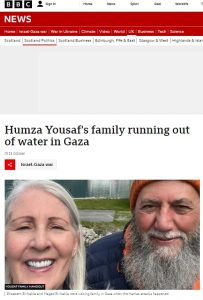
‘Humza Yousaf’s family running out of water in Gaza’
“Elizabeth El-Nakla and her husband Maged – the parents of Mr Yousaf’s wife Nadia – travelled to Gaza to see a sick relative.”
(See additional reports on the same travellers here and here.)
‘Doctor in Gaza: I woke up to sounds of explosions’
“A British surgeon on a charity trip to Gaza has described how constant shelling from Israel forced him to cancel all his scheduled operations. […]
He has been visiting Gaza for decades to help patients there.”
‘British couple trapped in Gaza with no UK help, says son’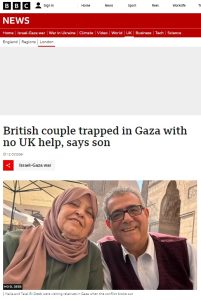
“Naila and Talal El-Deeb, from London, were visiting relatives in Gaza when the violence erupted on Saturday with Hamas’s attack on Israel. […]
Mo, from Marylebone in central London, told BBC News both his parents were originally from Gaza and his dad went back to visit family a couple of months ago, with Mrs El-Deeb joining him two weeks ago.”
‘‘I just find bombs, dead people… it’s really scary’ – British-Palestinian girl in Gaza’
“Mariam went to visit her family in Gaza before Saturday’s surprise attack on Israel by Hamas.”
‘In Gaza’s crowded Khan Younis, 90 people shelter in one house’
“Ibrahim AlAgha and his wife Hamida had been enjoying an extended holiday in Gaza when Israeli air strikes on the territory began.
The couple, who are Irish citizens, had wanted their three Dublin-born children to get to know their Palestinian relatives and learn about the language and culture.”
‘Manchester scientist trapped in Gaza fears being killed in air strikes’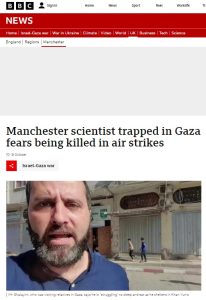
“Mohammed Ghalayini, 44, who lives in Manchester, was visiting 15 Palestinian relatives when Hamas attacked Israel on 7 October, killing 1,300 people. […]
Mr Ghalayini had returned to his hometown of Gaza City in September, intending to stay for three months.
He was on a career break, he said, and had wanted to reconnect with his father and half-brothers.”
‘Gaza family tell of desperate journeys to border in search of safety’
“The family moved from Blackpool in Lancashire to the Gaza Strip, where members of Mr Abuaassi’s family still live, just under a year ago. His wife and children have British passports.”
‘Blackpool family try to flee Gaza at Rafah crossing’
“Her son explained how they had been spending time in Gaza with his father’s family trying to learn Arabic before the bombing started.”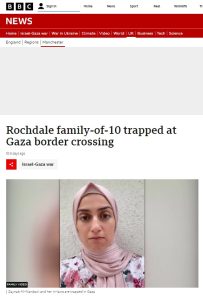
‘Rochdale family-of-10 trapped at Gaza border crossing’
“The Al-Attar family from Rochdale arrived two days before Hamas attacked Israel on 7 October, prompting a bombardment of Gaza.”
‘Welsh doctor trapped in Gaza tells of ‘terror’ for family’
“The doctor and his family arrived in Gaza three days before the attacks. When the crossing border [sic] was closed, they became “trapped”. […]
The doctor had been visiting relatives he supports financially in an area where 80% of the population already relied on international aid.”
Interestingly, none of those reports explains which border crossing those foreign visitors had used in order to enter the Gaza Strip.
On October 29th the Telegraph reported that:
“At least 200 British citizens are thought to be registered with the UK authorities inside the coastal enclave, and some 600 Americans, as well as many other nationalities.”
Telegraph readers also learned that:
“Hamas is blocking foreign nationals including Britons from leaving Gaza, the United States said on Sunday… […]
American officials said that Israel and Egypt were prepared to let foreigners leave the Strip which is under heavy Israeli bombardment, but Hamas had refused. […]
Jake Sullivan, the White House’s chief security adviser, said: “The Egyptians are prepared to let Americans and other foreign nationals out of Gaza. The Israelis have no issue with that. But Hamas is preventing their departure and making a series of demands.”
UK Government sources said they shared US concerns that Hamas could block foreign nationals from leaving Gaza unless demands are met, effectively holding them hostage in a war zone.”
Remarkably, visitors to the BBC News website did not see any reporting on the topic of Hamas’ refusal to allow foreign nationals to leave the Gaza Strip despite the corporation’s extensive reporting on British citizens stuck in the territory.
On the morning of November 1st reports emerged concerning the possible opening of the Rafah crossing. The BBC News website’s live page reporting included the following:
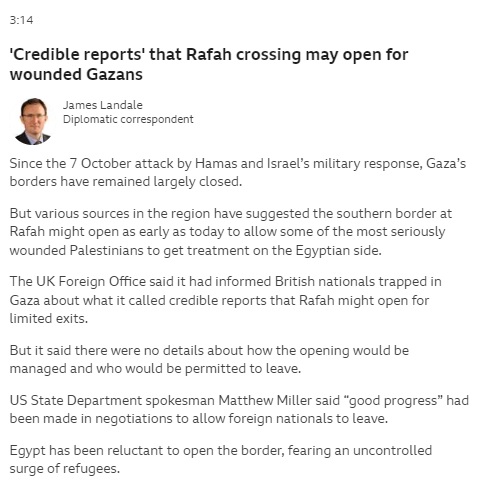
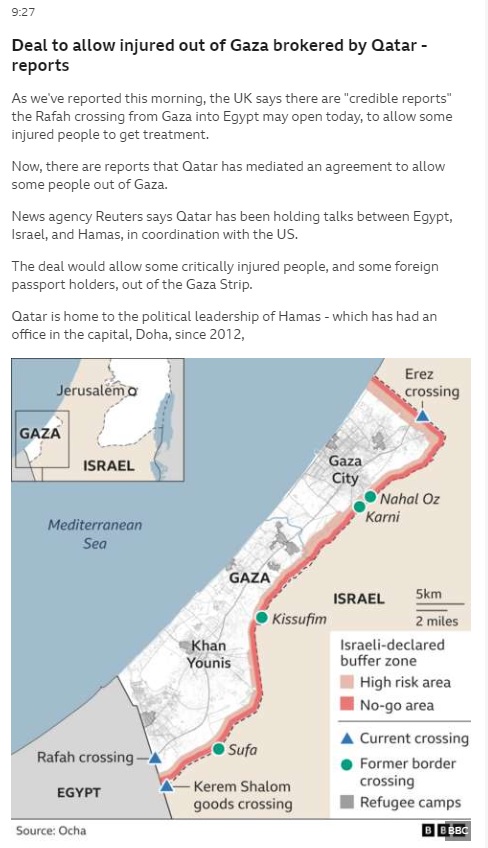
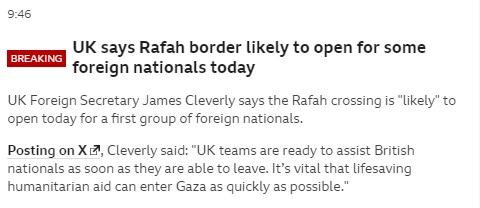
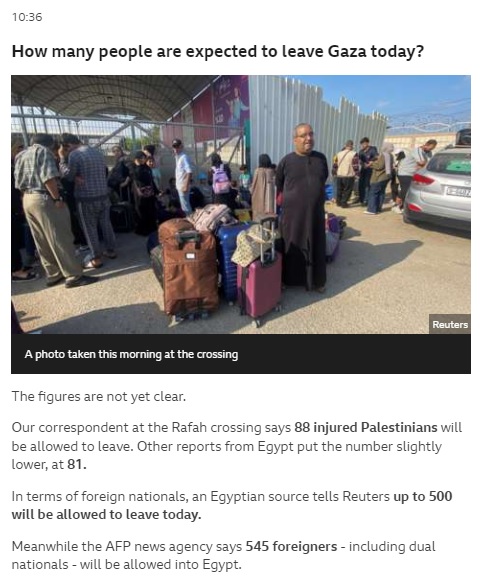
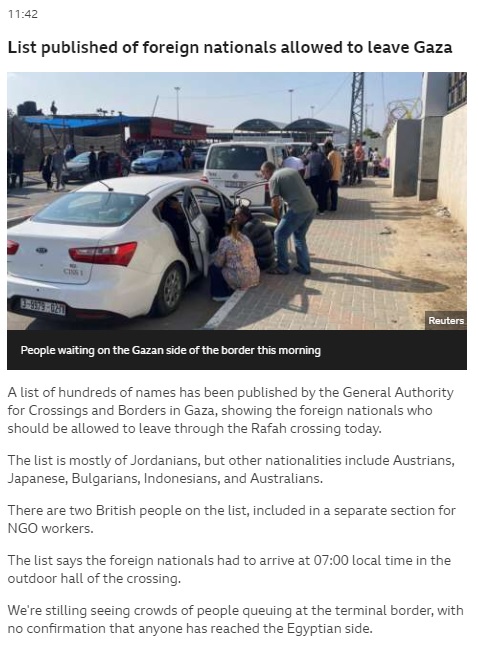
BBC audiences were not informed that the General Authority for Crossings and Borders in Gaza is run by Hamas.
In the hours that followed, the BBC News website published several reports relating to the opening of Rafah crossing for the exit of foreign nationals:
‘I simply don’t want to die at 24’ – Gaza woman trapped at Rafah crossing
Egypt opens Gaza border crossing to evacuate injured and foreigners
Rafah crossing: First Britons leave Gaza but others face nervous wait
Israel-Gaza war: Three reasons Egypt tightly controls the Rafah crossing
Only one of the BBC’s new reports – ‘What is the Rafah crossing and why is it Gaza’s lifeline?’ – mentions the fact that the proscribed terrorist organisation which initiated the current conflict exercises control over that border crossing.
“Hamas and Egypt exercise control over who can pass through”
That is particularly significant in light of messaging promoted in an additional article – Palestinian Americans trapped in Gaza feel ‘hopeless and abandoned’.
“So desperate is the 51-year-old to have his wife and children back home that, on Monday, he filed a federal lawsuit accusing the US government of discrimination and failure to do its duty towards its citizens.
The legal action, which names Secretary of State Antony Blinken and Secretary of Defence Lloyd Austin as defendants, alleges the family has been “let down and ignored as if we are second class citizens”.
“Bringing out citizens to safety is supposed to be a top priority for them in a time of war like this. Why are they not doing it?” he asked.”
Not only has the BBC made no effort to explain to its audiences how so many foreign nationals managed to travel to a place it has been describing as an “open-air prison” for at least a decade, but it has to date completely avoided the subject of Hamas’ weeks of refusal to allow those foreign visitors to leave, thereby distorting audience perceptions of the story.

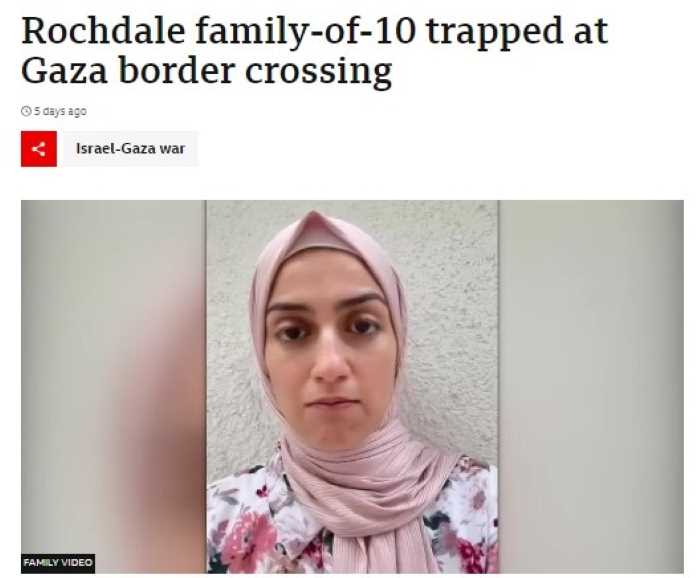




Howse about the BBC issuing a Report on the conflict from the Israeli viewpoint. Ha-ha – sick joke.